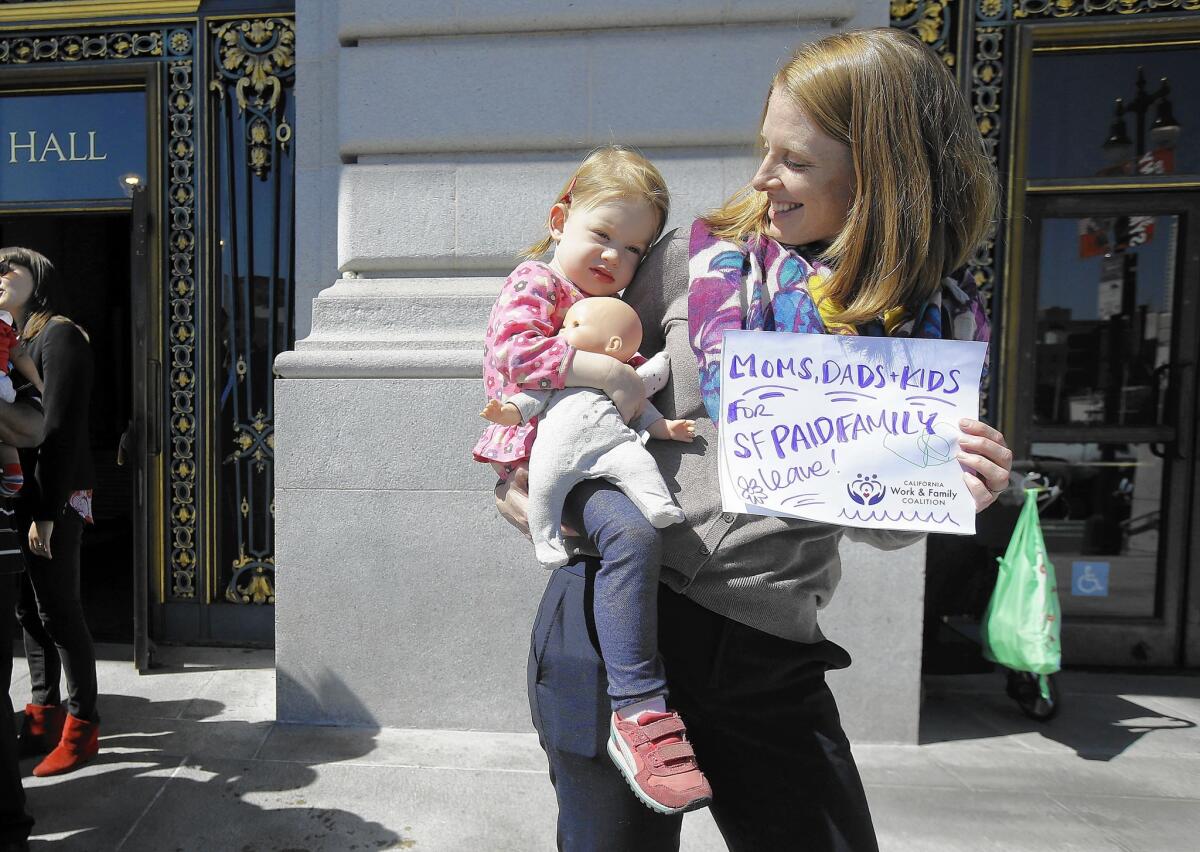Q&A: Why paid parental leave won’t go national

- Share via
San Francisco is making labor history by becoming the first U.S. city to require employers to offer fully paid leave to new parents.
The law providing six weeks of paid time off starts next year and includes mothers and fathers, including same-sex couples, who either bear or adopt a child.
The move comes as more large companies, especially thriving technology firms, are voluntarily expanding their parental-leave policies.
But coverage isn’t widespread on a government level. California is one of only three states — the others are New Jersey and Rhode Island — that mandate paid parental leave and none are at full pay. California gives working parents six weeks of leave at 55% of their pay.
There is no federal policy for paid leave and, for roughly half of working Americans, getting even unpaid mandatory time off for a newborn remains an unavailable luxury.
Brad Harrington, executive director of the Boston College Center for Work & Family, is an expert in the field and we asked him for an update on parental-leave trends. Here’s an edited excerpt:
Why is San Francisco’s new law so important?
Any form of fully paid parental leave in the United States is novel because U.S. policies lag so far behind the rest of the world, and not by a little but by a lot.
Of the 180 largest industrialized countries, all but two — the United States and Papua New Guinea — offer paid maternity leave.
There are a handful of progressive cities and states like California that have offered paid leave, but by and large it’s only partial-paid leave.
In lieu of a national policy, local decisions are being made about what can work well to help parents, and those are being made by states or municipalities or by individual corporations.
Is it also novel that San Francisco’s law applies to all new parents?
That’s a trend you’re seeing in parental leave. Companies are moving toward a standardized policy for both biological and adoptive parents, and now increasingly we’re also seeing them move toward a policy that’s gender neutral.
What is the outlook for more companies and state and local governments following San Francisco’s lead?
If you had asked me that a few years ago, I would have said the outlook was bleak. But you see a lot of the more successful, more progressive, vibrant cities now considering offering paid leave. The other thing you’re seeing a lot is corporations stepping up and doing this as well.
And it’s happening at a rate that really surprises us. A couple of years ago paid parental leave was barely on people’s radar.
One of the things about San Francisco is that the Bay Area obviously houses a lot of technology companies, and if you look at the companies that have the most aggressive paid-leave programs, they’re in Silicon Valley.
Do you see similar gains coming on a nationwide level?
As for as a national policy for the United States, I see zero possibility of that happening. I just feel the pushback we saw when President Obama moved forward with healthcare and health insurance for all — that really spoke to the resistance we have as a country to national policies that some people may see in some way hurting our competitive standing or business climate.
At some point we might reach a tipping point where we’ll have a lot of evidence to show that these kinds of family-friendly policies are not job killers but can foster a positive business climate. When we get to that point, then perhaps we’ll see national legislation.
What is the national law — the Family and Medical Leave Act — that was enacted in 1993?
If you work at a job site with 50 or more employees and meet other requirements you can take 12 weeks of unpaid leave. The only guarantee it offers you is that you’ll have a job to return to after your 12 weeks is up. But it’s unpaid.
That leaves out a lot of workers, doesn’t it?
Correct. It’s still true that majority of Americans work for small companies and small companies would probably be defined as having less than 50 employees.
How do you explain the shortfall in parental leave for so many?
The United States has always sort of accepted that we have a more individualistic society than others. We also accept the notion that the minute one of these issues comes up, then automatically you hear the same kinds of responses: That we can’t afford to do this, it’s going to be a job killer, it’s going to hurt our competitiveness globally. We say that in spite of the fact that our global competition is offering these kinds of benefits. People would prefer to try to keep taxes low, let individuals be responsible for their own care, and that’s sort of become the accepted value system in the U.S.
So the change will come at the local level?
It’s starting to change as a result of the reality that so many families now do not have an at-home spouse — both parents work — or the household is headed by a single parent. That’s one of the things that led to — certainly on the corporate side — people thinking we need to have more family-friendly policies because there is nobody home watching the kids.
Twitter: @PeltzLATimes
MORE BUSINESS NEWS
U.S. economy grows at slowest pace in two years
When Sports Authority closes, these retailers win
SeaWorld is urged to send its marine animals to ‘seaside sanctuaries’
More to Read
Inside the business of entertainment
The Wide Shot brings you news, analysis and insights on everything from streaming wars to production — and what it all means for the future.
You may occasionally receive promotional content from the Los Angeles Times.











